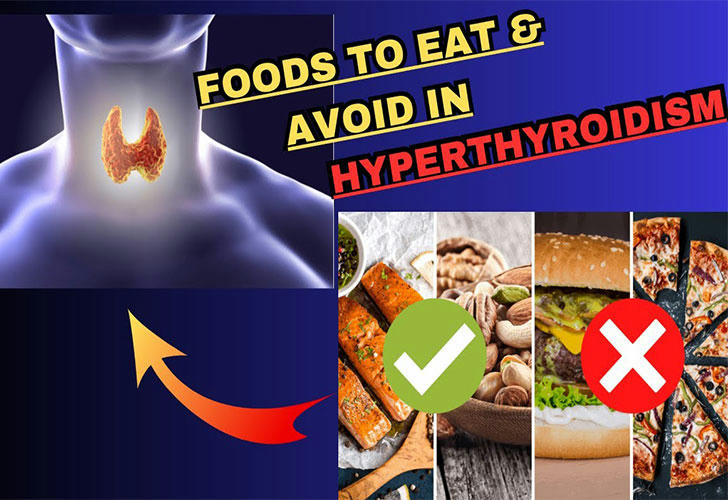What Diet Should People with Hyperthyroidism Eat?
Hyperthyroidism, a condition where the thyroid gland produces excess thyroid hormones, can lead to a range of symptoms including weight loss, increased heart rate, and anxiety. Diet plays a crucial role in managing this condition. This article will outline the recommended foods for individuals with hyperthyroidism, focusing on those that can help balance thyroid function and alleviate symptoms.

Understanding Hyperthyroidism
Hyperthyroidism can be caused by various factors, including autoimmune diseases like Graves’ disease, thyroid nodules, or excessive iodine intake. A well-planned diet can help manage symptoms and improve overall health. The key dietary strategies include reducing iodine intake and consuming foods rich in certain nutrients that support thyroid health.
Recommended Foods for Hyperthyroidism
1. Low-Iodine Foods
Why: Iodine is essential for the production of thyroid hormones. Reducing iodine intake can help decrease hormone levels.
Examples:
• Fresh fruits and vegetables (e.g., apples, berries, spinach, and kale)
• Whole grains (e.g., oats, quinoa, brown rice)
• Egg whites (avoid yolks as they contain more iodine)
• Unsalted nuts and nut butters
• Honey and maple syrup
2. Cruciferous Vegetables
Why: These vegetables contain goitrogens, which can inhibit the thyroid’s ability to use iodine effectively.
Examples:
• Broccoli
• Cauliflower
• Brussels sprouts
• Kale
• Bok choy
Preparation Tip: Cooking these vegetables may reduce their goitrogenic effects.
3. Foods Rich in Selenium
Why: Selenium is important for thyroid hormone metabolism and can help balance hormone levels.
Examples:
• Brazil nuts (high in selenium)
• Sunflower seeds
• Mushrooms
• Fish (like tuna and sardines)
• Whole grains
4. Iron-Rich Foods
Why: Iron is essential for overall health and helps maintain energy levels, which may be affected by hyperthyroidism.
Examples:
• Lean meats (chicken, turkey)
• Beans and legumes (lentils, chickpeas)
• Dark leafy greens (spinach, Swiss chard)
• Fortified cereals
5. Lean Proteins
Why: Protein helps maintain muscle mass and supports metabolic functions without excessive calories.
Examples:
• Skinless poultry
• Fish
• Eggs (preferably egg whites)
• Low-fat dairy products (if tolerated)
6. Healthy Fats
Why: Healthy fats support overall health and can help manage inflammation.
Examples:
• Olive oil
• Avocados
• Nuts and seeds
Foods to Avoid
1. Iodine-Rich Foods
• Avoid foods high in iodine such as iodized salt, seaweed, fish (especially shellfish), dairy products, and egg yolks.
2. Soy Products
• Soy can interfere with thyroid function; limit items like tofu, soy milk, and edamame.
3. Caffeine
• Caffeine can exacerbate symptoms such as anxiety and increased heart rate; consider reducing coffee, tea, and energy drinks.
4. Processed Foods
• Many processed foods contain high levels of sodium and unhealthy fats that can worsen symptoms.
5. Gluten
• Some individuals with hyperthyroidism may benefit from a gluten-free diet due to potential inflammatory responses; consult with a healthcare provider for personalized advice.
Recommended Products for Managing Hyperthyroidism
1. Low-Iodine Salt
• Use non-iodized salt for cooking to manage iodine intake.
2. Selenium Supplements
• If dietary intake is insufficient, consider selenium supplements after consulting a healthcare professional.
3. Whole Grain Products
• Incorporate whole grains for fiber and nutrients.
4. Nut Butters
• Choose unsalted nut butters for healthy fats without added sodium.
5. Blood Pressure Monitor
• Keeping track of heart rate and blood pressure is essential when managing hyperthyroidism.
Conclusion
Managing hyperthyroidism through diet involves focusing on low-iodine foods while incorporating nutrient-rich options that support thyroid health. By making informed food choices—such as consuming plenty of fruits, vegetables, lean proteins, and healthy fats—individuals with hyperthyroidism can alleviate symptoms and improve their overall well-being. Always consult with a healthcare provider or registered dietitian before making significant dietary changes to ensure they align with your specific health needs.
